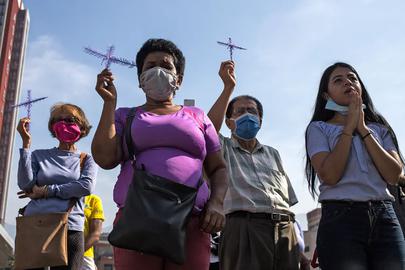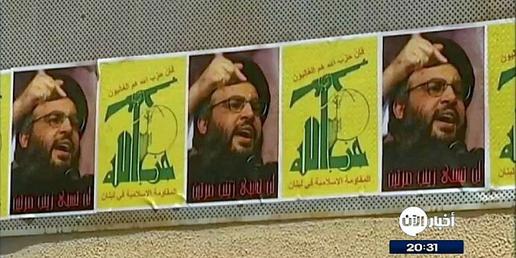This article is part of IranWire's ongoing coverage of Covid-19 disinformation in different countries, in partnership with Health Studio.
By Ximena Herrera for Health Studio
Two institutions dominate public life in Venezuela: the church and the state. But the pandemic has exposed a widening rift between the two. Increasing economic hardship in the country had previously put them in conflict, and coronavirus now appears to have exacerbated this antagonism.
Father Miguel Romero, a parish priest of San Francisco municipality and director of social media and communications for the Archdiocese of Valencia in Carabobo, says the pandemic has badly affected the Venezuelan church in the midst of what was already a very complex situation: "The country is submerged in a crisis which has worsened in the last two years. Economic and social issues have detracted from the health crisis. All this makes it more difficult to tackle the pandemic; the country cannot even buy paracetamol.”

Medical supplies to combat Covid-19 arrive in Caracas, Venezuela. This humanitarian aid was donated by Spain and Portugal.
Fr. Romero also says this has been a difficult time for the archdiocese; two priests died of the virus during 2020, and another is currently in hospital. The church has not been able to provide the aid it would have liked to for those afflicted by Covid-19 and in need of medical attention. "We have not been able to help many people with medicine,” Fr. Romero adds. “It is not that the medicines are not available, but the prices are too high for the purchasing power that exists now in Venezuela." And the need for such help is great: “It is very difficult for a person who earns $0.80 a month (the minimum wage in the country) to buy medicine for $3 or $4.”
The church has managed to support some people through the Caritas organization, but this priest also laments that they, too, have not been able to give out as much support as they would have wanted. "The churches have been closed for eight months, since April, which has made the collection and distribution of aid more complicated.”

A live-streamed Easter mass at a closed church during a nationwide quarantine due to coronavirus in Venezuela.
In July 2020 President Nicolas Maduro controversially called on Catholic leaders to lend their churches and facilities to government health services, so that they could be used as quarantine or Covid-19 treatment centers. Fr. Romero argues that the government's request was more confrontational rhetoric than practical solution, as, he says, the government is aware that the churches are not in a position to physically receive the infected and military barracks are better-suited to the task.
"Churches opened [to receive the sick] during the Spanish Flu and Yellow Fever,” he says, “as there was no other option. We are talking about 120 years ago. There was no infrastructure like there is today. While there was never an official response [to the government’s recent request], people nevertheless know that we have done everything we could."
The priest highlights the scale of the dispute between the government and the church regarding the state of the Venezuelan health system. The government is adamant that the health system is functioning perfectly and hospitals are in excellent condition. But the church, in line with doctors and medical professionals all over the country, observes the opposite: the system is in a state of collapse, health workers lack the resources to treat patients in hospitals and 80 percent of hospitals do not even have continuously-available running water. The priest also reiterates that Venezuela’s official Covid-19 figures do not align with reality: the number of deaths from is in all likelihood much higher than what has been officially announced.
On January 11, 2021, the Venezuelan Episcopal Conference urged the government to change its policy, saying it should have "enough integrity, rationality and feeling of love for the country to stop this sea of suffering of the Venezuelan people". It also recommended "a radical change in political leadership" in the face of the grave situation the country now faces. The Episcopal Conference also requested that the freedom of action of non-governmental organizations be guaranteed so that they "can help provide solutions to the various problems facing communities”.
Strikingly, the statement went on to say that the government “does not help solve the problems of the people, nor does it create confidence for the recovery of the country". Its authors also opined on Maduro’s installation of a new National Assembly, filled with regime loyalists, in January 2021, saying that it “lacks a democratic foundation, in the midst of ‘revanchismo’ (vengeful, provocative behavior and policies), the disqualification of opposition leaders, intimidation and threats of persecution".
For a country as religious as Venezuela to be in the midst of a global pandemic, and have the church and state openly accusing each other of lying and misleading people is a catastrophe. Transparency, clear messaging and faith in the person delivering the message is key to combating the virus, as the experiences of countries all over the world show.
visit the accountability section
In this section of Iran Wire, you can contact the officials and launch your campaign for various problems


























comments